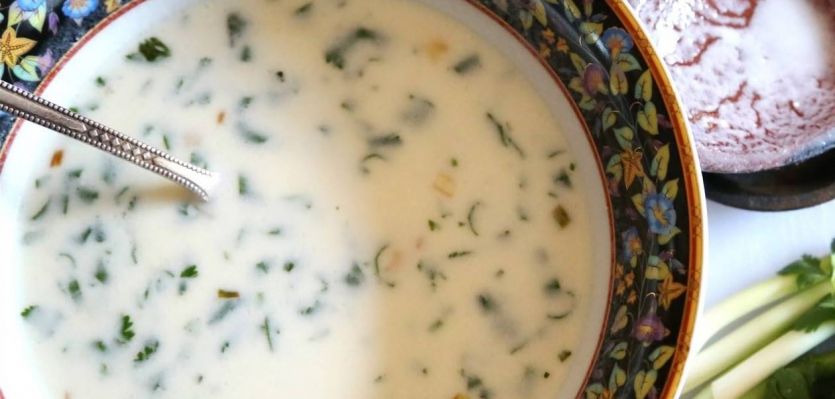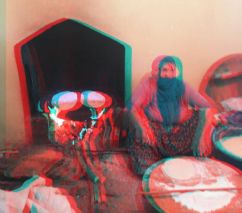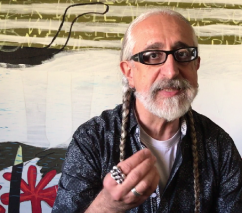Between bowls: The pursuit of Armenian identity, self-discovery, and the perfect bowl of soup
July 09, 2019
Inspired by his recent participation in Hamazkayin ArtLinks 2019, Los Angeles-based comedy writer and magician Missak Artinian (AKA Magic Missak, AKA the Armenian Channing Tatum) shares his story "Between bowls"—his pursuit of identity, self-discovery, and the perfect bowl of soup...
It was an unusually chilly spring afternoon in Glendale. I was sitting at a local diner, waiting for the tortilla soup I ordered for lunch and was in a pretty good mood because earlier that morning, my therapist had mentioned how nice my eyebrows looked, which I attributed to a new organic shampoo I bought that contained peppermint oil.
Just before the soup arrived at my table, I received an Instagram notification from my friend Hripsime who usually forwards me “Rick and Morty” memes, but this time, she sent me a post published by some professorial-looking dude named Khatchig Mouradian. The post featured a collage of six beautiful faces, one of whom was Atom Egoyan, a director whose work I’ve admired since before “Ararat” offended my grandmother, who, bless her soul, disagreed with the creative choice to include steamy sex scenes in a film about the Armenian Genocide.
Below the Instagram post, I saw an ad about a retreat in Toronto and a link for more information about a program called Hamazkayin ArtLinks. Its mission: to link young Armenians interested in their cultural heritage with internationally recognized figures who have backgrounds in creative literature, music, theater, journalism, and cinema.
The retreat sounded kind of cool, though I wasn’t entirely convinced that I would go at first; I wasn’t sure how invested I was in my cultural heritage. By most accounts, I’m not the paragon of “Armenianness” a proud Armenian father would want for his daughter.
“He doesn’t go to Church,” he would say to his wife on the drive back home, shaking his head while reflecting on the surj (coffee) I had burned in a transparent and futile attempt to impress the family.
“And did you notice the hand towel in his bathroom? Made of 100 percent Turkish cotton!”
The tortilla soup finally arrived at my table. It hit most of the right notes. Gooey cheese. Hearty broth. Chips that grew soggier by the second. My palette was comforted by this savory dish, yet my mind yearned for the embrace of an old flame, matzunov chorba*: an Armenian yogurt soup that I fantasize about constantly. The aroma of mint and red pepper flakes like an olfactory dream, triggering flashbacks of golden butter emerging out of mounds of balled beef, as it floats to the top of the tangy, white broth, forming a whirlpool of bold, pastel colors that could find a home in the frames of Pedro Almodóvar’s most passionate films.
Later that night, around 3 a.m., I lay tossing and turning in bed, consumed by guilt. I kept thinking about what had transpired at the diner and how unfair it was to the tortilla soup.
“What’s wrong?” she would ask if she were a person and lying in bed next to me.
“Nothing,” I would lie and tell her.
“Are you sure? You’ve been so detached lately.”
“I’m just stressed at work.”
“Oh. Okay,” she would reply, pulling herself away, knowing full well that I’m currently unemployed.
The next morning, I put Toronto and ArtLinks in the back of my mind. It was yet another cloudy day in Los Angeles and I found myself lured in by the fragrance of cilantro coming out of a Vietnamese restaurant. A large bowl of phở would surely put my troubled mind at ease, right? Wrong. Mid-slurp and I was already fantasizing about matzunov chorba again.
After a week of experimenting with various different dishes, even on hot sunny days—Cuban black bean soup, curry noodle soup, French onion soup— there was no escape.
Matzunov chorba. Matzunov chorba. Matzunov chorba.
Clearly, there was something there, buried deep inside me like the butter inside the mounds of balled beef, or kufteh, seeping through the cracks, rising to the surface, despite my best attempts at suppression.
I thought about Toronto again. And ArtLinks. About Khatchig Mouradian. Atom Egoyan. How their glasses kind of looked like mine. And I figured, you know, what the hell. Maybe I would find answers during the retreat. And even if I didn’t, I could use it as an opportunity to pitch Egoyan my screenplay idea about a lovable, wise-cracking cockroach who dreams of being a Twitch streamer but is discouraged by his traditional cockroach family. Think “Ratatouille”…with cockroaches.
Weeks passed by and I finally found myself at the Five Oaks Retreat Center in Paris, Ontario, with Armenians from the East Coast, West Coast, and Canada. I felt at ease talking to these new acquaintances, mainly because most of them spoke the Western dialect of Armenian—a change from 80 percent of my interactions with the Armenians of Glendale—which can feel like an elaborate game of charades that requires a complex read of facial expressions punctuated by a lot of ambiguous nodding.
Later that night, after everyone had arrived, we went around the room, introducing ourselves: where we came from, what we did, and wanted to do. For once, I was surrounded by a bright group of Armenians I could connect with based on similar interests: acting, cinematography, directing, and writing—a far cry from the young Armenians I grew up with in Virginia at Sunday school, whose interests included cars, sports, and the Bush Administration’s interventionist foreign policy.
By the end of our introductions, one of the event organizers informed the group that Atom Egoyan and his wife, actress Arsinée Khanjian, would not be able to attend due to personal circumstances. As unfortunate as this news was, the group remained in good spirits with supportive thoughts sent to Atom, Arsinée, and their family.
The following morning, Khatchig kicked off the first day by introducing Dr. Lisa Gulesserian, a lecturer at Harvard, who, according to the program, was going to teach us creative writing. I felt excited at the prospect of impressing someone from Harvard for the first time in my life. I’d taken a few creative writing courses and I knew how to string sentences together in sometimes evocative ways (usually by accident). I was ready for Dr. Gulesserian. I was ready for whatever prompt she had in store for us.
What I wasn’t ready for was a lecture on poetry and poetic language. Despite her inclusive lecturing style and kind demeanor, my heart palpitated and my pits perspired, like a checkers player who accidentally signed up for a chess tournament. When she introduced us to the concept of a hayren, a form of Armenian poetry from the 13th century, I had a hard time grasping the concept—all I could think about was how confusingly close hayren sounded to the word hayeren (the Armenian word for the Armenian language).
My anxiety mounted when Dr. Gulesserian prompted us to write our own hayren in a workshop setting. One of the members of my group, whose beard was much fuller than mine, wrote a poignant hayren about the struggle of running out of shampoo…in hayeren! How could I, an Armenian-illiterate, patchy-bearded, unpoetic philistine possibly compete with that?
I could not. So, I resigned myself afterward to the shower, where I cleansed myself of perspiration and the residue of disappointment. The disappointment lingered.
The next workshop was led by Anna Mikaelian, a pianist and the director of Nexus Center for the Arts in Yerevan. She helped bring our group together to compose a song using nothing more than our feet, hands, and a few basic instruments. Anna’s talents also brought many smaller groups together throughout the program. In one extraordinary, three-hour jam session (or séance, depending on who you asked), she and six other participants ventured together on a spiritual journey through piano, voice, and dance.
I remember sitting in a corner, admiring this beautiful medley, until finally, the voices in my head, which were telling me to remain passive, to stay in my comfort zone, to see life through the lens of a voyeur, slowly quieted as I entered a trance-like state. And I felt compelled—perhaps even possessed—to join in what I could only describe as a pagan ritualistic dance. It was one of the most extraordinary mind-body sensations I have ever experienced, and made me feel some semblance of a connection with our fire-worshipping ancestors, who, I think, lived in a time long before the word amot (the Armenian word for shame) was coined: an unfortunate idea that has pervaded our collective psyches. Thanks, Obama.
A couple of days later after the retreat, I was craving soup yet again, as I usually do when I’m in a reflective mood. A number of familiar options came to mind. Tortilla soup. Phở. Tom yum. French Onion Soup. But then, I considered an option that had, in the past, only occurred to me while enjoying other bowls of soup.
What about matzunov chorba?
It seemed so obvious. So easy. I mean, after all. I do live in Glendale, which probably has the largest concentration of Armenians outside of Armenia. And logic would dictate that there should be a plethora of restaurants that serve it, right?
After looking on Yelp, and calling over a dozen restaurants, I found only two that prepared what I had been craving, tucked away near the back of the menu, almost as if the owners were trying to tell customers, “Please. Order kabob instead. It’s way less work. And way higher profit margins.”
Thirty minutes later, I sat in one of the restaurants with the higher Yelp reviews, waiting for my bowl of matzunov chorba, which they called s’pas**. Not that it mattered. A rose by any other name, right?
I began to perspire again. What if it didn’t taste the same as I remembered? Or worse. What if I started to fantasize about matzunov chorba while eating matzunov chorba? What would that even mean?
In an effort to ease my anxiety, I texted my friend Hripsime. I thanked her for bringing ArtLinks to my attention. I told her about the experience, about the friends I made, about some of the things I learned during the retreat, like how Armenians are a loud people (as if we’ve convinced ourselves, on some unconscious level, that by increasing our volume, we can somehow convince the universe, let alone the person sitting a couple of rows away, that we exist).
I also learned that the quietest people sometimes have the most to say—and the saddest stories to tell.
I learned to listen. Not just to voices, but to bodies as well. I learned to recognize that we’ve all been betrayed, that we’ve all experienced loss, and that we’ve all been neglected, misunderstood, violated, and hurt: by our ancestral history, by our familial history.
I learned that our family trees may have dead, damaged, and diseased branches, but it doesn’t mean the whole tree is rotten. Nor does it mean that we should forget about the lost branches, the forgotten branches, the branches that may have fascinating stories still worth discovering.
Most of all, I learned the value of connection. How art and stories and music and laughter can bring us all together, help shape our identities, heal our traumas, and give meaning to our lives.
When the matzunov chorba arrived, I anxiously took my first sip of the broth. Just as I feared, it tasted nothing like how I thought it should. They put bulgur in it, for God’s sake. I mean, seriously. Who does that!?
But then, I took a deep breath and took a few more sips. I tried to appreciate the unique flavor, texture, and consistency, while considering that things don’t have to be familiar to be good; that there are different types of recipes, just as there are different types of people.
Suddenly, the voices in my head, which were telling me that I had made a mistake, that I should’ve gone to another restaurant, and had some other type of soup, slowly softened. And for the first time in a long time, I sat back, and I actually began to enjoy myself.
* Chorba (çorba), is the Turkish word for soup, which is occasionally used in some Armenian households. The Armenian word for soup is ապուր (pronounced ah-poor). Մածուն (pronounced Matzun is the Armenian word for yogurt. Adding -ով (pronounced -ov) in Armenian makes the noun instrumental: Մածունով (Matzunov) = "with yogurt."
** Also called tahnapur (թանապուր), s’pas (սպաս) is an Armenian yogurt soup popular in Eastern Armenian cooking. Grains (such as wheat, bulgur, lentils, and rice) and greens (such as parsley, cilantro, mint, thyme, and onions) are usually added to s’pas.
Join our community and receive regular updates!
Join now!




RedGrey
11 Jul, 2019 20:31:59 Edited
In our household this soup was known as ‘Makoor Aboor’. I remember my sister and I coining the term when we were kids, I suppose due to its color. I also remember years later experiencing Missak’s disappointment when I had S’pas in Armenia for the first time, expecting it to taste like my mother’s Makoor Aboor. Beautiful piece. Thank you.
3
Reply